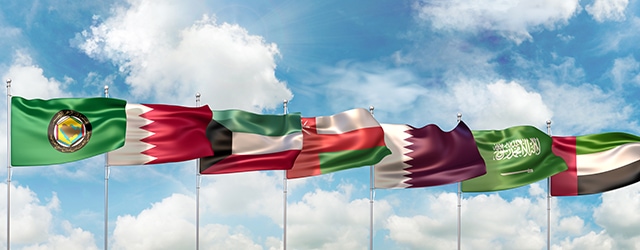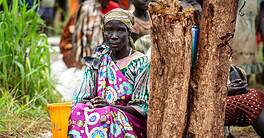Recent signs of outreach suggest an easing of the Saudi-Qatari quarrel. But don’t expect a united front against Iran.

More than two years after Saudi Arabia, the United Arab Emirates, Bahrain and Egypt cut ties with Qatar and imposed a blockade on the gas-rich Gulf state for allegedly supporting terrorism, some encouraging signs have appeared that the hostilities could be easing. Like Humpty Dumpty, however, it won’t be easy putting the Gulf Cooperation Council (GCC) back together again.
The first hints of a potential détente came in February, when an Abu Dhabi Ports circular indicated that the UAE had eased a ban on shipping goods to or from Qatar. The UAE kept its ban on vessels flying the Qatari national flag, but ships of other nations were no longer forced to call at ports in third countries when sailing between Qatar and the UAE.
More recently, Bahrain’s long-serving prime minister, Prince Khalifa bin Salman Al Khalifa, phoned Qatar’s emir, Sheikh Tamim bin Hamad Al Thani, to mark the start of the Muslim holy month of Ramadan. The phone call was a rare moment of contact between a high official of a blockading country and Qatar. Bahrain’s state-run news agency said it was limited to Ramadan greetings; but because of its close ties to Riyadh and financial support from the GCC, Bahrain probably would not have reached out without the tacit approval of the Saudis.
In the most hopeful sign to date, Saudi Arabia’s King Salman invited Qatar’s emir to attend an emergency GCC summit—in Mecca during the last week of Ramadan—on Iran’s alleged role in attacking Gulf shipping and oil installations. Because of its warmer ties to Iran, with which it shares the world’s largest gas field, Qatar could be in a position to act as an intermediary to ease the rising tensions between Riyadh and Teheran.
Qatari Prime Minister Sheikh Abdullah bin Nasser Al Thani attended the GCC summit in place of the emir, who is head of state. Nevertheless, it was the highest-level visit to Saudi Arabia by a Qatari official since the blockade was imposed in June 2017. The US has reportedly been pressuring the two sides to reconcile, and the visit suggested a possible US-backed thaw in Qatari-Saudi relations. Still, it brought no real breakthrough in resolving the underlying differences that led to the blockade.
The Qatari prime minister shook hands with King Salman in Mecca after both were encouraged to do so by Kuwait’s emir, Sheikh Sabah Al-Ahmad Al-Jaber Al-Sabah, who has acted as an intermediary in the dispute. There was also a quick handshake between the Qatari prime minister and Saudi Crown Prince Mohammed bin Salman.
However, King Salman’s opening statements at the GCC meeting were as unequivocal on Iran as always: “What the Iranian regime is doing, from intervening in regional countries’ affairs and developing its nuclear program, threatening global maritime traffic and global oil supplies, is a blatant violation of the treaties and principles of the United Nations.”
He added, “This is naked aggression against our stability and international security. [Iran’s] recent criminal acts … require that all of us work seriously to preserve the security … of GCC countries.”
Days later, Qatar’s foreign minister, Sheikh Mohammed bin Abdulrahman Al Thani, noted statements did not open a door for dialog. “They condemned Iran but did not refer to a moderate policy to speak with Teheran,” he said, according to Al Jazeera. “They adopted Washington’s policy towards Iran, and not one that takes the neighborhood into consideration.”
Returning To The “Right Path”
A solution to the Gulf crisis, Saudi Foreign Minister Ibrahim bin Abdulaziz Al-Assaf said, will be possible only if Doha returns to the “right path,” an indication that the kingdom’s position on the blockade has not changed.
“The mistrust within the GCC, which is illustrated by both Qatar’s perceptions of the blockading states and their views of Doha as a major threat to their ruling regimes, will not end because of Qatar’s participation in the GCC and Arab League summits,” Khalid Al-Jaber, director of the MENA Center for Research in Washington, wrote in a blog posted on LobeLog in late May.
Qatar nevertheless is continuing to support the GCC as an institution by participating in the summits. “Perhaps Qatar’s leadership believes that in the future, even if far down the road, the GCC could return to its former status as a relevant institution in regional politics,” wrote Al-Jaber, “and the government in Doha would like to confidently assert that Qatar, as a founding member of the Council, never walked away from it despite the Gulf crisis.”
This doesn’t change current realities, however. “Qatar views Saudi Arabia as a grave threat,” Al-Jaber wrote, “and the GCC as a toothless institution that is entirely incapable of providing the emirate with the form of protection that all six GCC member states (including Qatar) initially desired from the GCC when the body was formed in the early 1980s.”
Jason Tuvey, senior emerging markets economist at Capital Economics, agrees with this analysis. “The GCC is not particularly strong,” he says. “It is more of a meeting place for the Gulf countries.”
Saudi Arabia has always dictated the GCC line, he adds; and the other members have little real power, except perhaps for the UAE—which has its own separate economic and military partnership with Saudi Arabia.
The US has stepped back from involvement in the Saudi-Qatari dispute, Tuvey notes; although in the early months, President Trump appeared to take credit for the blockade, blaming Qatar for state funding of terrorism and radical ideology. Saudi Arabia and Qatar are both allies of the US; and Qatar is home to a major US airbase, Al Udeid, and 13,000 US troops.
No United Front
Qatar traces the origins of the quarrel to a story appearing on its news agency’s website in May 2017 falsely attributing remarks to the emir praising the Islamist groups Hamas, Hezbollah and the Muslim Brotherhood, as well as Iran. The article stirred the anger of Riyadh, which responded by cutting diplomatic relations with Qatar and imposing an air, land and sea blockade.
It was thought at the time that the blockade would be devastating to Qatar, since the peninsular country relied heavily on food imports across its land border with Saudi Arabia. However, Qatar turned to other sources and became more self-sufficient in food production, growing its own vegetables and importing milk cows.
“Qatar’s economy has successfully adjusted to the dual shocks of lower oil prices and diplomatic rift,” the International Monetary Fund said in June, following its latest consultation with the country. Overall GDP growth is expected to reach 2.6% in 2019, the IMF forecast, up from 2.2% in 2018.
Qatar, in other words, has shown it can live with the blockade indefinitely and is determined to have an independent foreign policy. And the GCC states are unlikely to present a united front against any aggression from Iran. In light of the recent tentative contacts, however, it is possible that the GCC will continue to serve as a meeting place where the six nations can discuss issues of mutual interest. Hundreds of families separated by the blockade are still hoping for a restoration of freedom of movement between the member states.
“The GCC’s politics have always had a strong element of personalization,” Jane Kinninmont, senior research fellow and deputy head of the Middle East and North Africa program at Chatham House, wrote in a recent research paper. “The grouping was founded rather more on a sense of fraternity and commonality between individual rulers, than on an EU-style process of institution-building.”



